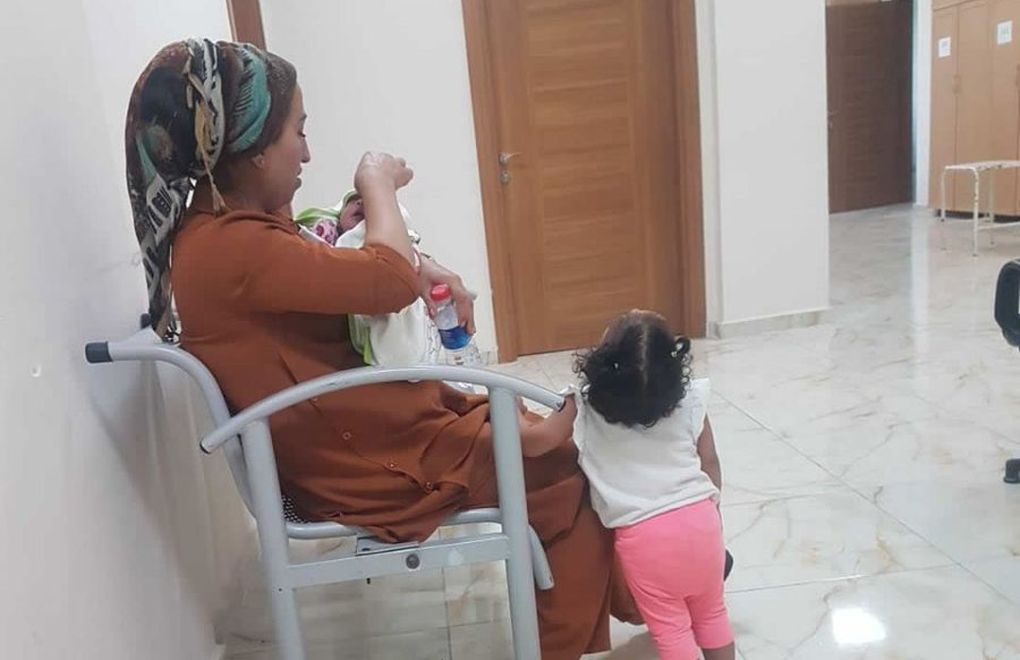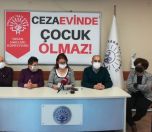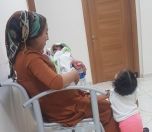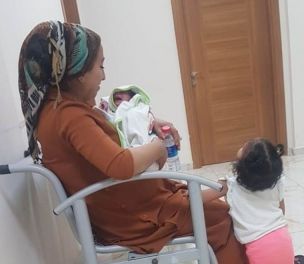Click to read the article in Turkish
The court has rejected the objection to the imprisonment of Eylem Oyunlu, who has been arrested in Turkey's Kurdish-majority Diyarbakır province and sent to prison with her 10-day-old and two-year-old babies.
Charged with "aiding the organization" as part of an investigation conducted by the Lice Chief Public Prosecutor's Office in Diyarbakır, Oyunlu was arrested by the Lice Penal Judgeship of Peace on June 17. She was then sent to Diyarbakır Women's Closed Prison with her two little children.
Examining the objection of her attorney to her imprisonment, the Penal Judgeship of Peace has concluded that arrest is a proportional measure for her and ruled that she shall remain behind bars.
'Great anguish to be quarantined with two children'
Yusuf Çakas, the attorney of Eylem Oyunlu, has indicated that the 45-day-old baby, who is suffering from an eye disease, needs to undergo treatment for a period of six months. "The baby is foreseen to undergo this treatment outside prison," attorney Çakas has indicated and added:
"However, mother Eylem does not really lean to this treatment because everytime the baby returns from hospital, she will need to be quarantined for 15 days. It is a great anguish for her to be quarantined with two children."
Application to Constitutional Court
Attorney Çakas has also said that the arrest of Oyunlu was examined; however, the attitude of the judge was negative:
"He said that the treatment could be done in prison conditions and rejected it. A ruling was given for the continuation of arrest. We made an application to the Constitutional Court with a request for cautionary judgement. It has not yet been concluded, but I am hopeful about it. Because the Constitutional Court previously gave positive judgements in such cases."
Joint statement by 25 organizations
On the other side, 25 organizations have released a statement about the imprisonment of Eylem Oyunlu with her two babies. "Turn your face to children," the statement is entitled, indicating the following in brief:
'Both children are sick'
"As diagnosed by the prison doctor, Eylem Oyunlu's not officially registered one-month-old baby has lacrimal duct obstruction and her two-year-old daughter is suffering from chronic bronchitis.
"While prison conditions will - without a doubt - have a negative effect on children's illnesses, it is also possible and indispensable as per the Article 109 of the Code of Criminal Procedure to impose a measure on Eylem Oyunlu other than arrest as she is still in postpartum period.
"Eylem Oyunlu, the mother of two children in need of access to the right of healthcare, was arrested after she was summoned to depose at the Public Prosecutor's Office and, with the rejection of the objection to her arrest, the right to health and personal security of both her her and her two children has been violated by the hand of judicial authorities.
'Precedent case is disregarded'
"In a precedent case, Constitutional Court gave a ruling in favor of the applicant; but, this ruling has also been disregarded by judicial authorities.
"A prisoner named Şükran İrge, held with her two children in Diyarbakır Type E Prison, applied to Constitutional Court. Accepting the application dated June 28, 2016, Constitutional Court ruled that the necessary measures should be taken. Despite this ruling of the Court, there are almost 800 children still held with their mothers in unhealthy prison conditions."
'Restriction of children's freedom is unacceptable'
Concluding their statement, the organizations have noted that both the first verdict of arrest against Oyunlu and the rejection of the objection to her arrest are in violation of the provisions of both the international conventions that Turkey is a party to and domestic legislation of the country.
The statement has also referred to the Article 2 of the UN Convention on the Rights of the Child, underlining that it is valid for all children:
"States Parties shall respect and ensure the rights set forth in the present Convention to each child within their jurisdiction without discrimination of any kind, irrespective of the child's or his or her parent's or legal guardian's race, colour, sex, language, religion, political or other opinion, national, ethnic or social origin, property, disability, birth or other status."
Noting that "growing up in healthy conditions without being separated from one's mother is one of the most fundamental rights to be enjoyed by children," the statement has stressed that "the restriction of children's freedom and the continued imprisonment of ill children despite medical reports is unacceptable." (AÖ/SD)







